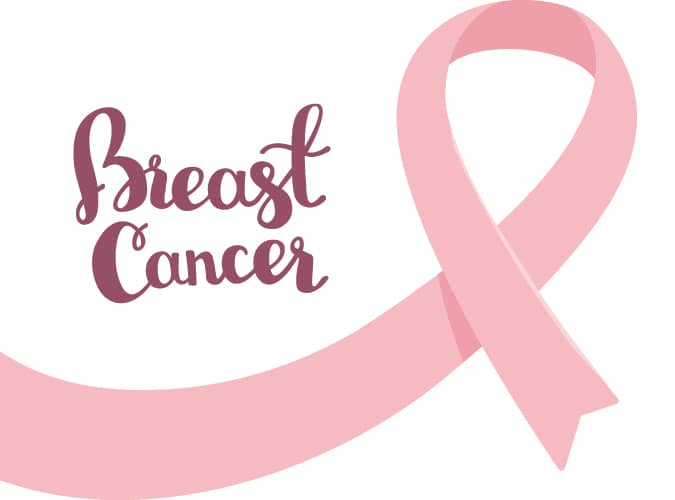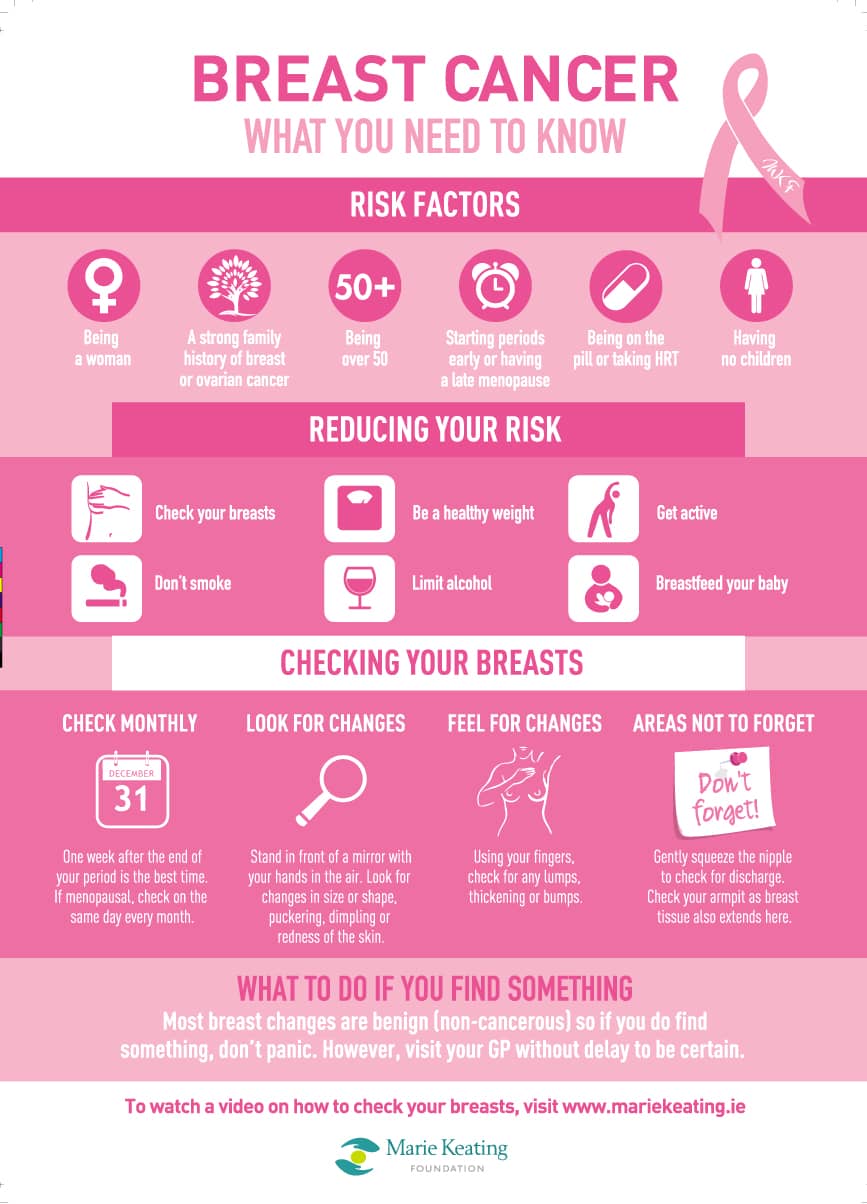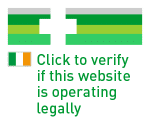Are you aware that October is Breast Cancer Awareness Month?

For so much of this year, Covid-19 has gloomily overtaken all our lives and as a result people are less aware of things and of other health issues which need us personally to keep a check on.
Whilst it is tragic that many lives are being lost through Covid-19, it is important to also point out that many other diagnoses of cancer and other terminal conditions are now being missed or are being detected later because everything has centred around Covid-19. This is something Dr. Ciara Kelly from Newstalk has been advocating for a while, and being honest I’m inclined to agree with her.
A few Facts:
- Breast cancer is the second most common cancer in women in Ireland, skin cancer being the most common. However, the number of breast cancer cases is on the increase.
- Every year around 3,351 cases are diagnosed and 728 die from the disease in Ireland.
- 28 men in Ireland are diagnosed with breast cancer each year.
- Breast cancer is most common in women from 50 years onwards but it can be diagnosed at a younger age.
- 1 in 9 women will be diagnosed with breast cancer in their lifetime.
Mary Harney (ex Minister for Health), left her mark on the health system some fifteen years ago with the setting up of centralised expert cancer centres around Ireland, it is safe to say that many improvements have been made in the field of Breast Cancer and as a result many lives have been saved. However, with Covid-19, everything it seems has been put on stand-by.
It is now more important than ever to check your breasts and all around the armpit area for any changes/lumps regularly. (See the breast-aware self checks below). And if you are part of the target group for screening please attend your appointments when they are available. If you feel like something needs attention contact your GP for an appointment as soon as possible. Like all cancers, the earlier it is detected increases your chances of successful treatment. Breast cancer, when caught early, has the highest five year net survival rate, of 85%, but is the most common cancer in women in Ireland. Breast cancer survival rates are continuing to increase each year. There are more than 2,533 women living in Ireland currently, who have survived breast cancer.

In simple terms, the breast is made up of millions of cells. Breast cancer develops when a single cell or group of cells begin to multiply out of control and forms a tumour. It mainly affects women, but men can get it too.
Although we do not fully understand Breast Cancer and how it comes about in its entirety that are several know risk factors that increase a women’s risk. Knowing these risks can help you take important steps in looking after yourself. They include:
- Being a woman – the female hormones oestrogen and progesterone can promote breast cancer cell growth.
- Starting your periods at a younger age or having a late menopause increases the risk of breast cancer.
- A family history – women who have relatives with breast cancer have a higher risk of developing the disease themselves. Risk increases with the number of close relatives diagnosed. But even so, almost nine out of 10 breast cancers occur in women with no close relatives diagnosed with the disease.
- Getting older – the risk of developing breast cancer goes up with age. The older you are, the greater your chances of developing the disease. Around four out of five breast cancers occur in women aged 50 and over.
- Hormones and reproduction – the female sex hormone, oestrogen, can affect the development of breast cancer. Many of the things that affect the risk of breast cancer can be explained through their effect on hormone levels. Taking hormone replacement therapy (HRT) or oral contraceptives (also known as the pill) increases the risk of breast cancer. But HRT is an effective treatment for menopausal symptoms, and the pill also reduces the risk of ovarian and womb cancers. If you are considering starting or stopping HRT or the Pill, or if you have any concerns, see your doctor.
- Having no children – having children and breast feeding both lower the chances of developing the disease. The more children a woman has, and the younger she is when she has them, the lower her risk.
Be Breast Aware!
Looking after yourself, being self-aware is every much as important as a visit to the GP. This means knowing what is normal for you so that if any unusual change occurs, you will recognise it. Detecting any abnormalities at an early stage can dramatically increase your chances of treatment success if necessary.
Remember to get into the habit of looking at and feeling your breasts on a regular monthly basis.
Whilst this list is not exhaustive changes in your breast to be aware of include:
- A change in size or shape – it may be that one breast has become larger.
- Changes in the nipple – in direction or shape, pulled in or flattened nipple.
- Changes on or around the nipple – rash, flaky or crusted skin.
- Changes in the skin – dimpling, puckering or redness.
- ‘Orange peel’ appearance of the skin caused by unusually enlarged pores.
- Swelling in your armpit or around your collarbone.
- A lump, any size, or thickening in your breast.
- Constant pain in one part of your breast or armpit.
However, it’s worth pointing out that hormone fluctuations through various stages in your life can play an impact on changes in your breast. These include:
- Your menstrual cycle: Each month, when you are having periods, your breasts often change. They can become bigger, tender and lumpy usually before a period starts and return to normal once the period is over. Some women, however, may have tender, lumpy breasts throughout their cycle.
- Pregnancy & breast-feeding: The changes that occur during your menstrual cycle continue during pregnancy. While breast-feeding, your breasts may be very enlarged, firm and tender; this is normal at this time. However, you should continue to check your breasts and discuss any unusual changes with your GP.
- Menopause: After the menopause your breasts will feel softer and they may get bigger or smaller. If there is a change in only one breast, you should discuss this with your doctor. HRT hormone replacement therapy may cause your breasts to feel firmer and quite tender.
Upon examination/consultation your GP can refer you on to a breast specialist for further examination. Your Doctor may also refer you for some tests – ultrasound, mammogram, biopsy if necessary.
Can I reduce the risk of getting breast cancer?
Other environmental and dietary factors which we can take personal responsibility for, include such things as our diet, exercise and control of alcohol consumption. Having a balanced diet, increasing regular exercises (at least 3 times weekly) and reducing alcohol consumption will reduce your risk of most cancers. If you smoke – stop; and if you don’t – don’t start.
Finally for those aged 50 – 68, a Breast Screening service has been rolled out nationally to those eligible every 2 years. The service is free and has saved many lives. The Breast Screening service detects abnormalities in the breast tissue by way of a mammogram (X-Ray) before even noticeable symptoms develop. Make sure you are on the regster to avail of this service by contacting BreastCheck directly at Freephone 1800 45 45 45 or visit their BreastCheck website.
In summary, during this pandemic it is vital to be aware of oneself – physically and mentally. These are extremely tough times for everyone. Although Covid-19 has already cost the lives of some 1850 individuals, some 3100 cases of Breast Cancer are detected annually of which it will affect 1 in every 9 women. — Surely something to be self-aware of!
References:
